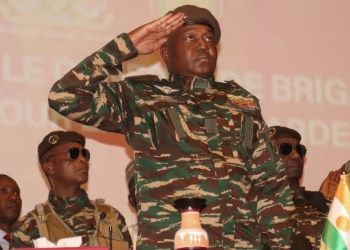Deputy President Rigathi Gachagua faces a potential impeachment challenge, especially if President William Ruto decides to support the initiative.
Although the motion has not yet been formally introduced, there are reports that Members of Parliament (MPs) are being approached to sign it. President Ruto has reportedly strengthened his position in Parliament by forming a political alliance with former Prime Minister Raila Odinga.
Political analysts believe that MPs in both the Senate and the National Assembly could still be influenced to align with their party leaders. However, opinions vary on how feasible this is, given that removing a Deputy President requires 233 votes in the National Assembly and 45 in the Senate.
Parliament has struggled to reach the necessary numbers for significant legislation, such as the two-thirds gender law. The only bill that achieved a supermajority was the BBI bill, which had the support of 235 MPs.
The Kenya Kwanza coalition consists of 231 MPs in the National Assembly, with 179 elected through the coalition and others drawn from the opposition. Ruto’s United Democratic Alliance (UDA) has 139 MPs, while Ford Kenya and the Amani National Congress, linked to Musalia Mudavadi, each have six.
On the minority side, Raila’s ODM party has the highest representation with 85 MPs, numbers that could complement Ruto’s support following the coalition’s formation.
With this backing, Ruto could potentially secure around 220 votes even before gaining support from Ford Kenya and ANC. MPs have often voted along party lines on key issues, but an impeachment vote is inherently political and subject to manipulation.
The collaboration between Ruto and Raila could provide a near-supermajority in the National Assembly, which could be detrimental for Gachagua if the parties vote cohesively.
In the Senate, Ruto’s coalition commands over half of the 69 seats, a figure likely to increase with Raila’s involvement. Senators such as Karungo Thang’wa (Kiambu), John Methu (Nyandarua), and Kamau Murango (Kirinyaga) have publicly expressed their support for Gachagua.
Observers suggest he may also receive backing from those who are uneasy with the current broad-based government. However, opinions are split regarding the Deputy President’s chances of survival.
Some believe his fate was sealed when Ruto appointed allies of Raila to the Cabinet, effectively diminishing his political power. “It seems like the end for him. If an impeachment motion is initiated, he might not survive,” said political analyst Herman Manyora.
Last week, 69 MPs from Mt. Kenya expressed their support for Interior Cabinet Secretary Kithure Kindiki over Gachagua. A meeting of lawmakers who support Gachagua yielded only 52 members, and it was reported they aimed to recruit more MPs to oppose any impeachment motion.
Kajiado South MP Samuel Parashina emphasized that the Deputy President should be allowed to complete his term. “Any plan to undermine him will not succeed. We are ready for them in Parliament with that motion,” the ODM MP stated.
Notable supporters of Gachagua include MPs Mejjadonk, Njeri Maina (Kirinyaga WR), Jayne Kihara (Naivasha), Joseph Munyoro (Kigumo), Onesmus Ngogoyo (Kajiado North), and James Gakuya (Embakasi North).
Gachagua might also benefit from political shifts in Azimio, as Wiper leader Kalonzo Musyoka seeks to establish his influence. Some ODM MPs are reportedly negotiating with Gachagua for an alliance ahead of the 2027 elections, which could further bolster his numbers.
Wiper has 25 MPs in the National Assembly who may join forces with Gachagua’s allies in UDA, who have opted not to align with the status quo.
However, other analysts argue that removing Gachagua would not be straightforward, given his influence in rallying grassroots support against critics. “They claimed they would sign the impeachment motion immediately after the Nyandarua declaration, but they couldn’t muster the numbers,” Gathiru warned.
The Deputy President recently cautioned Mt. Kenya MPs against “taking the wrong bus,” suggesting they risk losing in the 2027 elections.
Political analyst Albert Kasembeli noted that the political landscape is more nuanced than mere numbers, arguing that those advocating for Gachagua’s removal might not overshadow him. He pointed out that some MPs are unhappy with Raila’s alliance with Ruto, which could lead to rebellion among party members.
Dr. Charles Nyambuga, a political commentator from Maseno University, highlighted the importance of the Mt. Kenya region in this political puzzle. “The battle will be fought and won in the mountain. Is the mountain with Gachagua or the MPs? The answer is uncertain,” he said.
He also noted that the number of MPs who have distanced themselves from the Deputy President should not be overlooked, especially considering the significance of their electoral bases.
“There’s a strong likelihood that MPs from Nyanza and other regions will vote against Gachagua. He might face significant challenges,” he cautioned. “His focus has been primarily on the central region, engaging with the public rather than the leadership, which could be problematic.”
An unassuming MP from Mt. Kenya East confided that if a motion were presented, it would likely pass. “Many MPs from the mountain are unhappy with him. They want to address this before 2027 to protect their political futures,” the lawmaker said.
Critics of Gachagua accuse him of fostering division and concentrating state resources in Mt. Kenya. Specific charges against the Deputy President remain undisclosed, but sources suggest they may relate to connections with recent protests.
The Deputy President could be impeached under Article 150 of the Constitution, which allows for removal due to physical or mental incapacity, or impeachment for gross violations of the law, criminal conduct, or gross misconduct.
An MP seeking to initiate impeachment must gather at least 116 signatures from the National Assembly. The motion requires a minimum of 233 votes for passage to the Senate for further proceedings.
The Senate must convene within seven days to hear the charges, and it may appoint a special committee to investigate the matter and report within ten days. If the committee finds insufficient evidence, no further action will be taken; if allegations are substantiated, the Senate will vote on the impeachment charges, allowing the Deputy President the opportunity to respond.















